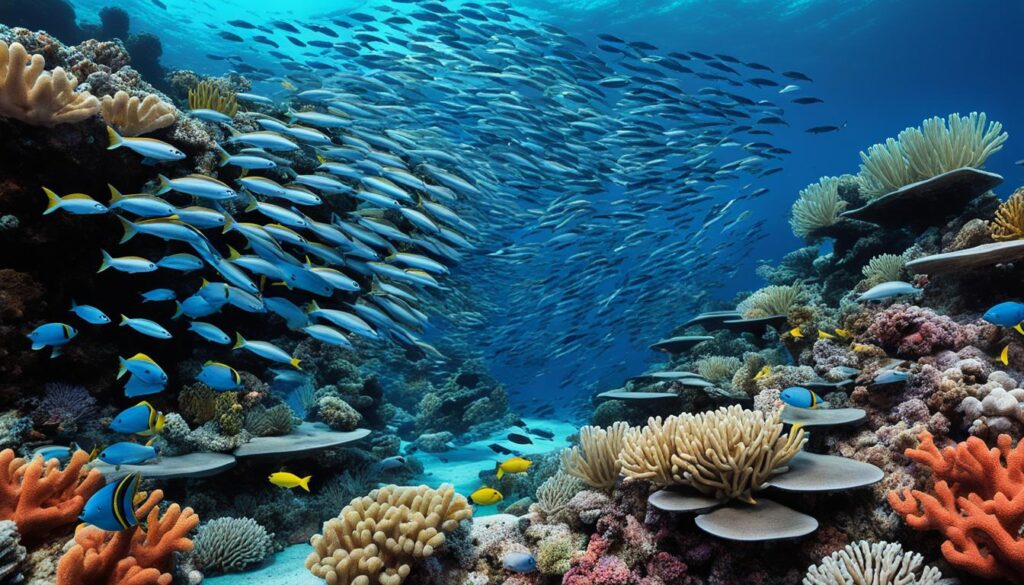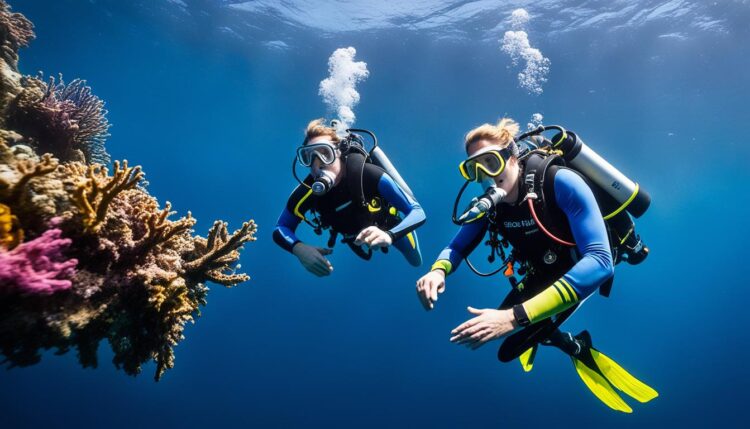Oceanography, the comprehensive study of the Earth’s oceans, holds vital importance due to its ability to unlock secrets about our planet’s climate, biodiversity, and natural resources. Covering over 70% of the Earth’s surface, the oceans are integral to climate regulation, marine biology, and the health of marine ecosystems. Advancements in oceanic research have been driven by cutting-edge technology and a heightened understanding of ocean currents and underwater exploration. These strides are essential as we face environmental challenges that necessitate sustainable solutions for the future.
Key Takeaways
- Oceanography is essential for understanding the role of oceans in climate regulation.
- Advancements in technology have propelled oceanic research to new heights.
- Studying marine ecosystems helps us comprehend biodiversity and its conservation.
- Ocean currents play a crucial role in the Earth’s climate system.
- Underwater exploration continues to reveal new marine species and ecosystems.
The History and Evolution of Oceanography
Oceanography, as a systematic field of study, found its beginnings with noteworthy expeditions. The HMS Challenger Expedition (1872-1876) stands out as a pioneering endeavor, setting the stage for systematic exploration and research in marine science. This landmark expedition systematically explored the depths of the oceans, resulting in significant advancements and a deeper understanding of marine environments.
One of the critical milestones in oceanography was the detailed study of the Mariana Trench and its profound depths. The first detailed surveys of this region unveiled the Challenger Deep, the deepest known part of the world’s oceans. Efforts like these underscored the need for advanced technology in deep-sea exploration, leading to innovations that continue to shape marine science today.
The mid-20th century saw substantial progress, particularly driven by the necessities of World War II. Innovations such as sonar mapping and the development of submersibles during the late 1950s and 1960s significantly enhanced our understanding of oceanic functions. These technological advancements were crucial for navigating and studying previously inaccessible parts of the ocean, thereby supporting marine science’s growth.
Modern oceanography also owes much to Remotely Operated Vehicles (ROVs) and advanced sonar technologies. These tools have facilitated more precise and efficient mapping of the ocean floor, revealing intricate details about marine ecosystems. Such detailed insights have proven invaluable in areas ranging from biodiversity studies to understanding geological phenomena in regions like the Mariana Trench.
As oceanographic science continues to evolve, the pioneering work of the HMS Challenger Expedition and subsequent technological innovations remain foundational. They have forged a path that modern marine science continues to tread, aiming for sustainability and deeper comprehension of Earth’s marine environments.
The Role of Technology in Modern Oceanographic Research
Technology plays a pivotal role in modern oceanographic research, enabling scientists to explore and document the ocean’s depths like never before. Innovations in *marine research technology*, such as *AUVs*, *ROVs*, and remote sensing, have revolutionized our understanding and interaction with marine environments.
Autonomous Underwater Vehicles (AUVs)
*AUVs* are sophisticated, unmanned devices that navigate the ocean autonomously. They are integral to *marine research technology* due to their ability to collect data from regions previously deemed inaccessible. AUVs facilitate comprehensive *ocean mapping* by capturing high-resolution seabed imagery and monitoring marine biodiversity and chemical compositions.
Satellite-based Remote Sensing
*Satellite imagery* has transformed oceanographic research by providing real-time data on sea temperatures, ocean currents, and marine pollution. This technology enables expansive *ocean mapping* and enhances our capacity to track large-scale oceanographic phenomena, significantly impacting climate and weather prediction models.
Sonar and Mapping
Sonar technology is crucial in contemporary *ocean mapping* efforts. It utilizes sound waves to map the seafloor, revealing underwater topography and geological formations. This method, combined with *ROVs* and other *marine research technology*, provides precise and detailed maps that are essential for various marine research applications, from ecological studies to resource exploration.
The integration of these advanced technologies has dramatically enhanced our ability to study the oceans. By leveraging tools like *AUVs*, *satellite imagery*, and sonar mappings, scientists can conduct more thorough and accurate marine research, aiding in the preservation and understanding of the world’s oceans.
| Technology | Function | Applications |
|---|---|---|
| AUVs | Autonomous Navigation | Ocean Mapping, Biodiversity Studies |
| Satellite Imagery | Remote Sensing | Weather Prediction, Marine Pollution Tracking |
| Sonar | Acoustic Mapping | Seafloor Topography, Geological Surveys |
The Influence of Ocean Currents on Climate and Weather
The interaction between ocean currents and the atmosphere plays a monumental role in regulating the Earth’s climate. This ocean-atmosphere interaction is pivotal for distributing heat globally, influencing both regional and global weather patterns.
Heat Distribution
Ocean currents act as conveyor belts of warm and cold water, significantly impacting global temperatures. This process, known as oceanic heat transport, ensures that equatorial regions do not become too hot, while polar regions remain warmer than they would otherwise be. The efficiency of this heat distribution aids in climate regulation, making it a vital aspect of understanding global climate dynamics.
Impact on Weather Patterns
The movement of ocean currents affects weather patterns significantly. For instance, the El Niño and La Niña phenomena are directly related to shifts in ocean currents, which in turn influence atmospheric conditions across the globe. By comprehending these patterns, scientists can better predict weather phenomena and contribute to more accurate climate regulation strategies. Satellite technologies have been instrumental in studying these complex dynamics, providing essential data for weather forecasting and climate analysis.
Exploring Deep-Sea Life: A Frontier in Marine Biology
The investigation of deep-sea ecosystems has revolutionized marine biology, unveiling a wealth of marine biology discoveries and enriching our understanding of ocean biodiversity. This ever-expanding field has given scientists unprecedented insight into the complex interactions and adaptations that characterize life in one of the most inhospitable environments on Earth.
Discoveries of New Species
One of the most remarkable outcomes of exploring deep-sea ecosystems is the identification of new species. These marine biology discoveries are not just a testament to the resilience of life but also underscore the vast, uncharted diversity harbored in ocean biodiversity. With each dive and technological advancement, researchers continue to encounter species previously unknown to science, ranging from bioluminescent organisms to highly specialized predators adapted to extreme pressures and darkness.
Ecosystem Dynamics
Understanding the dynamics of deep-sea ecosystems is crucial for comprehending the broader picture of ocean biodiversity. These ecosystems, teeming with unique life forms, function in harmony despite the harsh conditions. Research into these dynamics reveals intricate food webs, symbiotic relationships, and survival strategies that enable life to thrive in the deep ocean. Recent advances in genetics and imaging technologies have been instrumental in mapping these interactions, providing a more systematic and detailed exploration of these enigmatic habitats.
| Aspect | Findings |
|---|---|
| New Species | Hundreds of new marine species discovered annually, ranging from microorganisms to large predators. |
| Ecosystem Dynamics | Complex food chains and energy transfer systems that sustain life under extreme conditions. |
| Technological Advances | Deployment of advanced genetic and imaging tools to study deep-sea life more systematically. |
The Importance of Oceanography in Climate Change Research
Oceanography plays a crucial role in understanding the climate change impact and provides insights into shifting weather patterns, ocean acidification, and rising sea levels. Through meticulous study, oceanographers assess the health of our oceans, helping to develop strategies to mitigate these changes and protect marine ecosystems.
The vast body of the ocean significantly influences climate and weather. By studying ocean currents, temperature distribution, and marine chemistry, scientists can make predictions about global climate patterns. This is imperative for preparing for potential climate change impacts.
One of the major concerns addressed by oceanography is ocean acidification. As the oceans absorb increased amounts of carbon dioxide from the atmosphere, their pH levels drop, leading to detrimental effects on marine life, particularly organisms with calcium carbonate structures like corals and shellfish.
Moreover, the study of rising sea levels is paramount. Thermal expansion of water and melting polar ice caps are leading to higher sea levels, which can cause significant geographical and socio-economic impacts. Coastal communities are particularly vulnerable to these changes, making oceanographic research essential for adaptation and mitigation planning.
Here’s how specific oceanographic studies contribute to climate change research:
| Study Area | Contribution |
|---|---|
| Hydrography | Measures changes in sea levels, water flow, and ocean depth. |
| Marine Chemistry | Analyzes the chemical composition of seawater to understand ocean acidification. |
| Physical Oceanography | Studies ocean currents and heat distribution impacting global climate. |
| Biological Oceanography | Investigates the impact of environmental changes on marine life. |
In summary, oceanography offers invaluable data and perspectives that are vital for comprehending and addressing the climate change impact, ocean acidification, and rising sea levels. This field of research is indispensable for developing effective strategies to preserve both marine and human life amidst the challenges posed by a changing climate.
Human Impact on Marine Ecosystems
Human activities have profoundly affected marine ecosystems. Overfishing, pollution, and conservation efforts are central to understanding the overall impact on oceans and their biodiversity.
Overfishing and Resource Depletion
Overfishing has led to a significant depletion of marine resources, threatening the balance of oceanic ecosystems. Fisheries management and sustainable fishing practices are essential to counteract these effects. Utilizing scientific data, researchers can advocate for policies that ensure long-term marine conservation.
Marine Pollution
Pollution remains a critical issue, with plastics and chemicals contaminating marine habitats. Ocean pollution remedies are urgent, with ongoing research identifying methods to reduce waste and mitigate damage. These efforts are vital for the health of marine species and overall biodiversity.
Conservation Efforts and Solutions
Marine conservation initiatives aim to protect and restore ocean environments. Establishing marine protected areas (MPAs) and implementing restoration projects are crucial steps. By promoting sustainable fishing practices and reducing pollutants, these measures contribute to a healthier ocean ecosystem.

Collaborative efforts in research promote effective solutions, fostering a balance between human activity and marine ecosystem health.
Interdisciplinary Nature of Oceanography
Oceanography represents a compelling intersection of multiple scientific disciplines, fostering innovative solutions to complex marine challenges. The integration of diverse fields such as geology, biology, chemistry, physics, and engineering is critical for in-depth ocean studies, nurturing comprehensive insights into marine environments.
Integration with Geology, Biology, Chemistry, Physics, and Engineering
By blending expertise from geology, biology, chemistry, physics, and engineering, oceanographic research gains a multi-faceted perspective, essential for understanding ocean dynamics. This cross-disciplinary research is evident in projects like the Ocean Science for Sustainable Development Decade, which merges physical and chemical oceanography to monitor climate change impacts and marine biodiversity.
Collaborations in Oceanographic Studies
Marine science alliances play a pivotal role in advancing oceanographic research. Collaborative efforts, like those by the Intergovernmental Oceanographic Commission (IOC), demonstrate the power of pooling knowledge from various oceanographic institutions. Such collaborations not only enhance the quality of research but also ensure the sustainable management of marine resources through shared data and joint missions.
| Field | Key Contributions to Oceanography |
|---|---|
| Geology | Understanding seafloor structures and tectonic activity |
| Biology | Studying marine species and ecosystem dynamics |
| Chemistry | Analyzing seawater composition and chemical processes |
| Physics | Exploring ocean circulation and physical properties of water |
| Engineering | Developing tools and technologies for marine exploration |
Historical Expeditions in Oceanography
The realm of oceanography has been significantly advanced through various pioneering marine exploration endeavors. Historical deep-sea expeditions have laid the foundational knowledge for numerous nautical scientific discoveries. Two of the most notable expeditions that revolutionized our understanding of the oceans are the H.M.S. Challenger Expedition and the Nautilus Expedition.
The H.M.S. Challenger Expedition
Launched in 1872, the H.M.S. Challenger Expedition marked a monumental step in pioneering marine exploration. Over a 3.5-year journey, the Challenger covered nearly 70,000 nautical miles, collecting unprecedented data on ocean depths, marine life, and seabed composition. This expedition was instrumental in laying the groundwork for modern oceanographic research, yielding the first comprehensive understanding of deep-sea ecosystems and hydrological patterns.
The Nautilus Expedition
The Nautilus Expedition, led by renowned explorer Robert Ballard, utilized cutting-edge technology to provide high-definition imaging of the seafloor. This deep-sea expedition emphasized international collaboration and advanced the capacity for real-time data sharing among scientists globally. The Nautilus has greatly contributed to nautical scientific discoveries, including the identification of new marine species and the mapping of underwater geological formations.
| Expedition | Year | Key Contributions |
|---|---|---|
| H.M.S. Challenger | 1872-1876 | First extensive deep-sea exploration, comprehensive oceanographic data collection |
| Nautilus | 2008-present | High-definition seafloor imaging, real-time data sharing, discovery of new species |
Technological Innovations Driving Future Ocean Exploration
Continued technological advancements are crucial for the future of ocean exploration. By integrating cutting-edge tools for marine exploration innovation, scientists can significantly improve their understanding of underwater ecosystems.
Advanced Remote Sensing Tools
Advanced remote sensing tools represent a new age in marine exploration innovation, enhancing our ability to study and map the ocean’s depths accurately. These tools are vital in ocean data acquisition, providing real-time visualization and comprehensive data for researchers.
Real-time Data Collection and Analysis
Real-time data collection and analysis is revolutionizing oceanographic research. Using advanced marine technology, scientists can now gather continuous and precise data, allowing for more dynamic and responsive studies of marine environments. The synergy of these technologies fosters a better understanding of our oceans with unprecedented detail.
| Technology | Benefits |
|---|---|
| Remote Sensing Tools | Accurate mapping, real-time visualization, enhanced ocean data acquisition |
| Real-time Data Collectors | Continuous precise data, dynamic studies, responsive research |
The Societal Benefits of Oceanographic Research
Oceanographic research has made significant contributions to society by offering critical insights that guide sustainable resource management and ecological disaster strategies. The continuous study of our oceans not only enriches our scientific understanding but also fosters the development of practical solutions for pressing global issues.
Sustainable Resource Management
Effective management of marine resources hinges on robust scientific data. Oceanographic contributions provide a foundation for promoting resource sustainability through careful monitoring and management practices. These necessary insights enable policymakers to develop regulations that ensure the longevity of marine ecosystems while balancing economic needs.
Disaster Preparedness and Mitigation
The ocean yields vital information that can improve our disaster preparedness and mitigation strategies. Predictive models based on oceanographic data facilitate early warning systems for phenomena like tsunamis, hurricanes, and coastal erosion. Implementing efficient ecological disaster strategies can drastically minimize damage and save livelihoods, reinforcing the importance of continuous oceanographic research in safeguarding communities.
The Challenges and Future of Oceanographic Studies
The field of oceanography faces numerous challenges as it delves deeper into the mysteries of our oceans. One of the most pressing oceanography challenges is climate change, which affects marine ecosystems and oceanic currents, making consistent data collection increasingly difficult. Additionally, securing funding for future marine research poses a significant obstacle, as budget constraints often limit the scope and duration of scientific expeditions.
Another logistical difficulty is the inhospitable nature of deep-sea environments. The technology required to explore these profound depths must withstand extreme pressures and temperatures, necessitating innovative engineering solutions. However, despite these difficulties, the future of oceanography holds promise. Advancements in technology, such as autonomous underwater vehicles and real-time data collection systems, are paving the way for more efficient and comprehensive studies.
Beyond addressing technical and financial barriers, there is a growing emphasis on environmental sustainability within the field. Researchers are increasingly integrating sustainable practices to ensure that marine exploration and conservation efforts do not harm the environments they aim to protect. As we move forward, fostering collaborations across disciplines and institutions will be crucial in tackling these oceanography challenges effectively. The future marine research endeavors hold the key to unlocking greater understanding and protection of our planet’s last frontier.
FAQ
What is the importance of oceanography?
What was the HMS Challenger Expedition?
How does technology impact modern oceanographic research?
How do ocean currents influence climate and weather?
What has been discovered in deep-sea exploration?
How does oceanography contribute to climate change research?
What are the human impacts on marine ecosystems?
What is the interdisciplinary nature of oceanography?
What are some historical oceanographic expeditions?
How are technological innovations shaping the future of ocean exploration?
What are the societal benefits of oceanographic research?
What challenges does oceanography face today?
Source Links
- https://www.nationalgeographic.org/media/ocean-exploration/
- https://www.omicsonline.org/pdfdownload.php?download=open-access-pdfs/exploring-the-depths-advancements-in-oceanography-research.pdf&aid=126645
- https://www.linkedin.com/pulse/exploring-depths-significance-oceanography-today-forecastro-jtl7e












